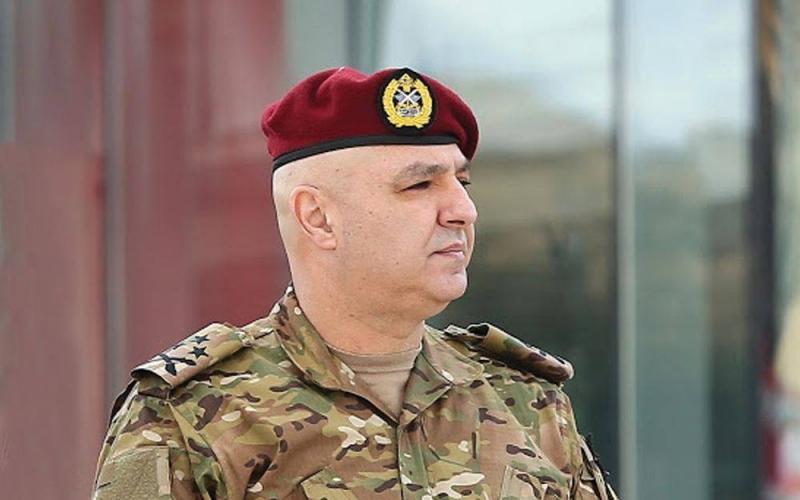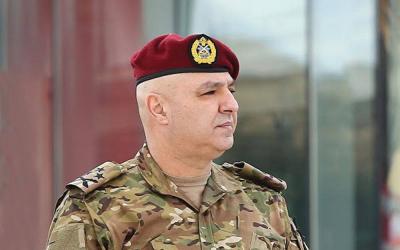The crisis within the military institution has resurfaced five months before the extended term of Army Commander Joseph Aoun ends, as he is set to retire on January 10. Political and constitutional opinions diverge regarding how to fill the commander’s position to maintain the military institution’s cohesion and its role in ensuring internal security and stability. Various solutions have been proposed to resolve this dilemma, which represents the peak of the crisis facing constitutional institutions due to the vacancy in the presidency. However, all these options encounter legal obstacles that are difficult to navigate.
Informed sources about potential solutions have noted that the Parliament may find itself compelled to extend the term of the army commander and the heads of security agencies once again. They indicated in a statement to "Asharq Al-Awsat" that this extension may not be limited to military and security leaders but could also encompass all public sector employees if a proposed law for a two-year extension for all public sector employees is approved.
The caretaker government led by Najib Mikati faced a tough political battle that resulted in the appointment of Brigadier General Hassan Aouda as Chief of Staff in the Lebanese Army, who alone is authorized to perform the duties of the commander in his absence. However, Defense Minister Maurice Sleem opposed this appointment and quickly challenged the decision before the State Council, which has yet to decide on the appeal. Sources confirmed that the military institution would be in a very precarious position if General Aoun retires before a successor is appointed or a legal mechanism is agreed upon to manage the institution in the absence of an active commander.
They explained that the decree to appoint the new Chief of Staff has not yet been published in the official gazette, and even if it were issued, it would not allow him to replace the commander and exercise his full powers. They stated: "The Defense Law limits the role of the Chief of Staff to specific tasks; he substitutes for the commander when the latter is traveling or absent for health reasons, but does not take over the full duties of the commander in the event of a vacancy." Therefore, we are facing a real problem if General Aoun retires before a president is elected or a new commander is appointed at the head of the army.
Calls for extending the army commander's term for a second time have resurfaced as a legal solution to the crisis, a point emphasized by legal expert and head of the Justice Association, lawyer Dr. Paul Markaz. He indicated that it is essential for the Parliament to issue a law extending General Joseph Aoun's term, citing justifications including the ongoing conflict on the southern front and the recurrent Israeli assaults on Lebanon. He simultaneously noted the impossibility of appointing a new army commander by a caretaker government, raising concerns about it being a resigned government first and the difficulty in reaching a quorum for the appointment session. Even if a quorum were achieved, Article 65 of the constitution requires the approval of two-thirds of the government members, which is unattainable given the current political division.
Markaz also mentioned the difficulty of appointing a commander during the presidential vacancy, reminding that the President of the Republic is the supreme commander of the armed forces and, as stipulated in Article 49 of the constitution, he is the one who endorses the name of the commander and monitors military conditions with him. Currently, this is not feasible.
The disagreements between the army commander and Defense Minister Maurice Sleem have widened, with the latest conflict revolving around the selection process for over 118 officer cadets who were announced as successful but did not join the academy due to the minister's failure to sign their appointment decision.
In recent hours, efforts by the Culture Minister in the caretaker government, Muhammad Bassam Mortada, have succeeded, commissioned by Parliament Speaker Nabih Berri, in making headway in the officer cadet issue. Sources reported that based on communications and consultations, the army commander sent a letter to Defense Minister Maurice Sleem requesting the enlistment of 82 new officer cadets through a selection process to join the group of those who passed the competition. Indeed, the Defense Minister signed the commander’s letter and referred it to the Cabinet, raising the total number of this batch to 200 officer cadets. However, a source close to the army leadership noted that the matter hinges on the presence of genuine intentions to release the officer cadets' batch. The source reminded that the Defense Minister opposed the results of the cadet selection on the grounds that they did not meet the military institution’s enlistment criteria—so have they now met these criteria? What has changed for the minister to be convinced of the legality of the competition results and their selection?




